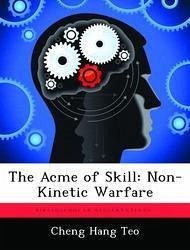Non-kinetic warfare, or conflict without the use of force for the purpose of inflicting physical damage, is rapidly gaining in importance. Scholars of war even from the time of Sun Zi have articulated that the enemy's destruction is neither essential nor necessarily the best route to ultimate victory. The insurgency attributes that have characterized many wars since World War II suggest that the objective of warfare has shifted from the kinetic destruction of military forces to the non-kinetic impairment of the enemy's will to fight. The four global trends identified here, economic prosperity, freedom of information, the rise of nationalism and globalization and interdependence, are possible causes for this shift, but, more importantly, they are factors that make war a less attractive option than ever. The last major conflict between major powers was won with barely a single kinetic conflict between the United States and the Soviet Union-an excellent model of non-kinetic conflict and perhaps a sign of things to come. In the Cold War, the military largely played a supporting role. In an age characterized by the information revolution and globalization, the Information and Diplomatic instruments of power will rise in importance. Even in a supporting role, the Military instrument nonetheless remains relevant, not least because kinetic conflict can never be ruled out. However its non-kinetic potential needs to be developed in order for it to be more effective in today's world. Three ways to achieving this end are: developing an interagency approach to the military; imbuing a supporting diplomatic role for the military; and a comprehensive and coherent information strategy not only for the military, but at all levels of government.
Hinweis: Dieser Artikel kann nur an eine deutsche Lieferadresse ausgeliefert werden.
Hinweis: Dieser Artikel kann nur an eine deutsche Lieferadresse ausgeliefert werden.








